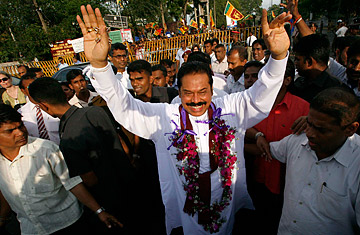
Sri Lanka's President Mahinda Rajapaksa waves to his supporters after winning re-election.
The tight electoral contest predicted between President Mahinda Rajapaksa and retired Army commander Gen. Sarath Fonseka failed to materialize when Sri Lanka went to the polls on Tuesday. Instead, Rajapaksa won easily — with 57.9% of the vote, by official count, 1.8 million more votes than Fonseka, who received around 40%. But Fonseka immediately rejected the result, alleging vote-rigging, prompting a tense standoff.
Fonseka, once a key ally in Rajapaksa's military victory against the Liberation Tigers of Tamil Eelam, told reporters that he refused to accept the results. He wrote to the elections commissioner, Dayananda Dissanyake, requesting him not to release the final tally until legal proceedings initiated to challenge the results were concluded. That request was ignored, and officials announced the results Wednesday afternoon.
At the same time, Fonseka became the center of a bizarre drama in one of Colombo's most upscale hotels. The general and his family and close aides had moved into the Cinnamon Lakeside hotel on election night after hearing reports that the government planned to send security forces to surround his house and office in downtown Colombo. Rumors soon started swirling. A text message purportedly sent by one of his daughters pleaded that the family had been prevented from leaving the hotel by soldiers deployed outside, and the message asked recipients to forward it to as many people as they could.
Hundreds of troops were, indeed, on the street outside the hotel, and the media were prevented from filming or taking pictures of them. But there were no restrictions on entering the hotel, where Fonseka held a prime-time press conference, claiming that his life was under threat from the government. "There is no democracy, this government is behaving like murderers," Fonseka said. Asked whether he was planning to leave the country, he said, "I have no intention of leaving the country, but if my security is under threat, I would have go to out temporarily."
The government denied that it was harassing Fonseka, his family or his aides, and claimed the election result as a vote of confidence in Rajapaksa. "It is a clear victory for the people; the people have made it clear who they prefer," Susil Premjayanth, a minister and the general secretary of the ruling United People's Freedom Alliance told TIME.
Despite the overwhelming victory reflected in the official tally, Rajapaksa did not fare well in the north and the east, home to most of the island's Tamil population. Their votes went to Fonseka, a sign of Rajapaksa's most serious task: winning the confidence of Sri Lanka's Tamil minority. During the height of the Tamil separatist insurgency, the LTTE controlled much of that territory, and Tamils there are still anxious and fearful about how they will be treated by the man who crushed the dream of a Tamil homeland. Rajapaksa sounded a conciliatory tone after results were announced: "I am the president of the those who voted for me and those who did not," he said.
If he is to deal effectively with burning Tamil grievances that led to over two and a half decades of bloodshed, Rajapaksa needs "to do something that no president has done so far," says Terrence Purasinghe, a senior lecturer at the Sri Jayawardenapura University in Colombo. "He will have to bring the minority Tamils into a position of political power, where they have some sense of control and not controlled by the center." Rajapaksa pledged to look at power sharing during the campaign, and Sri Lanka's Tamils are waiting to see whether those promises will be fulfilled. And the standoff outside the Cinnamon Lakeside suggests that the country's political turmoil may be far from over.
Read more in the new TIME book Earthquake Haiti: Tragedy and Hope and support TIME's Haiti relief efforts.
